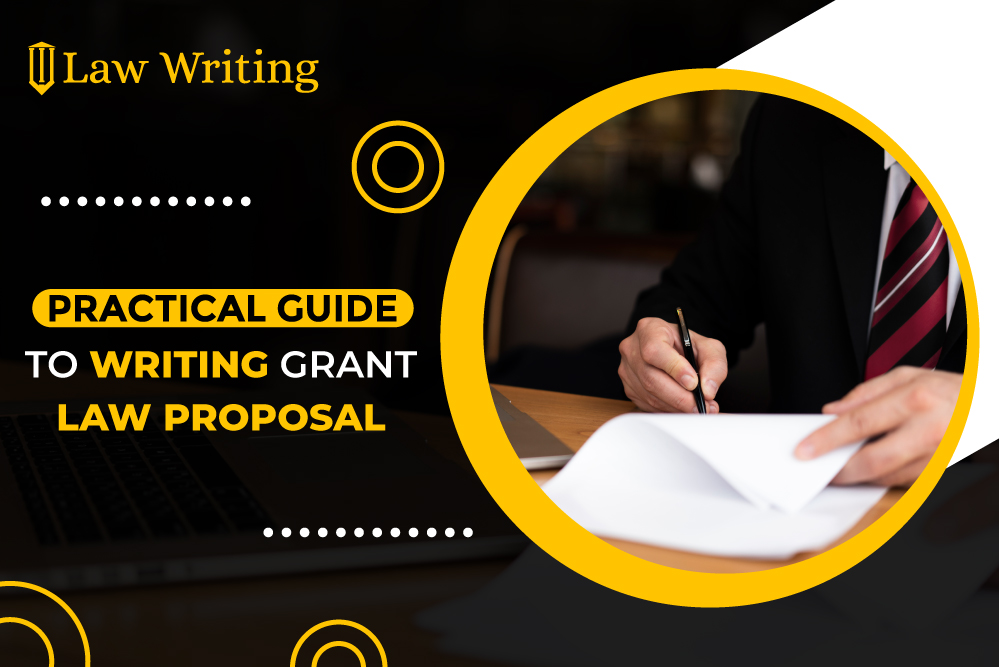Writing a grant law proposal requires careful attention and thorough reading to go through the careful legislative process. A grant law proposal is the document that seeks funding for various programs and initiatives. To construct a strong lawsuit a systematic approach is required that combines legal knowledge with persuasive writing abilities.
Crafting a comprehensive business law essay helps online entrepreneurs navigate legal complexities and ensure compliance with navigation. Grant law proposal provides a powerful tool to secure funding and support your projects and initiatives. Whether you are a non-profit organization seeking a funding program, a government agency aiming to address a public need, or an individual with creative ideas. In this guide, we will take you on a step-by-step guide journey on how you can write a grant law proposal. Let’s embark on this journey and learn how to transform your idea into legislation.
How to write a grant law proposal?
Writing a grand law proposal requires a deep understanding and critical thinking skills. You have to communicate your idea in a way that should affect the potential funders to support. You can write an effective grant proposal to communicate your idea and maximize your chance of securing funding by following these steps and guidelines.
1. Know your purpose
While writing a grant law proposal make sure you clearly define your purpose. State the issues and problems that are occurring and how they can be solved by taking legislative action.
2. Gather the information
Gather every information related to your issue that will help you in your grant proposal. Conduct the research to identify if there is anything you are missing out on. Identify any rule, regulation, and policy related to your topic.
3. Identify the funding resources
Identify where you can get enough resources for your proposal. Search for the Research government agencies, foundations, and other organizations that will provide the funding.
4. Clear objective and goal
Define the goal and objective of your proposal very clearly. Why are you writing this proposal, what are you hoping to achieve? through legislative action Make sure that your project is relevant and based on realistic hope.
5. Proposal outline
Make a proper outline of your proposal and decide the outline into sections like:
- Introduction: Provide the background of the proposal.
- Legislative framework: Outline the key provisions, eligibility criteria, and implementation plan.
- Evaluation: Define how this proposal will be evaluated and measured.
- Budget: Provide every detail of the implementation of the proposal including cost and other resources.
- Conclusion: Define the importance of your proposal and summarize your key points
6. Supporting evidence
Support your data with the evidence. Gather all the research findings and analytical data that will demonstrate the legislative action and the potential impact on your proposal.
7. Potential concerns and objectives
State the potential concerns and objectives proactively and address them in your proposal. Provide all the evidence to make your proposal effective.
8. Be clear and Concise
Your grand proposal should it be a concise and clear form. Make sure you avoid jargon and technical terms that are difficult for the reader to understand. Use simple language and use headings and bullet points to improve readability.
9. Submit and Advocate
Submit your proposal according to the deadline. Advocate for the proposal through policymakers, legislators, and shareholders for support.
10. Monitor Progress
As your proposal will go through the legislative process, monitor its progress. Follow up with the policymakers and funders to update you on the progress.
Getting an organization to write a proposal
Getting an organization to write a proposal requires several steps to align with the organization’s goal, clarity, purpose, and effective communication. The organization needs to reach out the potential funders and grab their interest in the project. For that, they will need a law proposal to know about all the accomplishments and budgeting they will need in the future.
Here is a guide on what should be covered in the proposal for an organization

Purpose: The purpose should be mentioned in the business proposal.
Key stakeholder: Involve the key stakeholders within the organization early in the process. Make sure that everyone understands the purpose.
Goals: Discuss what are your goals regarding this project and what you intend to do.
Conduct Research: Gather all the data through the research.
Outline: Make the outline of the proposal and include all the relevant details.
Budget: Discuss the budget. How much will the project cost?
Submit the proposal: Submit the proposal before the deadline
Identifying funding resources: Identifying the resources for the garnet law of proposal requires a lot more research, networking, and understanding the criteria of the potential funders.
Non-Profit Organization
Collaborating with non-profit organizations can be good because they share the same values and similar goals. Non-profit organizations receive support and are willing to partner with you for the grant law proposal. Partnerships with nonprofit organizations can be healthy because they will attend conferences and workshops so they can help you find a potential partner.
Corporate sponsorship
The corporate sector might have an interest in supporting initiatives related to your grant law proposal. They provide sponsorship opportunities through corporate social responsibility that provide funding for community projects, environmental opportunities, and other social causes.
Crowdfunding platform
Use a crowdfunding platform to raise funds for your ground law proposal. Some websites allow individuals to raise funds online through people’s donations. Create a campaign that will motivate people to contribute.
Community Foundation
Search for the community foundation. Community foundations are non-profit organizations that provide pool funding
International Organizations
If your proposal is focused internationally then you can get funds from international organizations. Some NGOs provide funds for the grant law proposal.
Basic components for proposal
With basic components in your garnet law of proposal, you can effectively communicate your ideas, goals, and plans to potential funders or policymakers increasing the chances of success in securing your initiatives. Each component is equally important.
Executive Summary
An executive summary is the foremost important in the grant law of proposal. It should be in a concise yet clear manner. Stating every fact and problem regarding the grant law of proposal. Describe the importance of this proposal in every key point.
Statement of Need
A statement of need is a special statement that carries all the details, and issues regarding the proposal. Provide evidence in the statement of need proving that your proposal is relevant.
Project Methodology
Project Methodology contains all the strategies and activities that should be mentioned in the grant law of proposal for your initiatives. All the resources that will be utilized in it.
Legislative Framework
Outline the project legislation, including key provisions, eligibility criteria, application procedures, funding mechanism, oversight measures, and reporting requirements. Provide a detail on how grant law will be implemented and enforced.
Project Sustainability
The grant law of proposal should carry all the strategies for ensuring the project’s long-term viability and sustainability beyond the grand period.
Partnership and Collaboration
Mention in the grant law of the proposal if there is any other partnership or collaboration with any other organization or individual involved.
Appendices
Add if there is any other specific document like the cover letter, Letters of support, or supplementary data.
Evaluation and Monitoring plan
Describe every detail of how the grant law of the proposal will be evaluated and monitored to assess its effectiveness and impact. Look for the key indicators that will be used to measure the effectiveness and progress of achieving goals.
Budget
Provide a detailed budget outline of the cost associated with the implementation of the proposed legislation. Include all the information on funding resources.
Conclusion
Summarize the key points of the proposal and write down the potential impact. Encourage support for the funds and express gratitude for the submission of the proposal.
Informational grant Law proposal

An informational grant law proposal connect to a legislative proposal aimed at providing information and guidance related to funding programs. Funding opportunities or the administration of the funds. Informational grant proposals play a crucial role in ensuring transparency, equity, and comprehensive information about funds programs. These proposals will help you make an informed decision and maximize the chances of funding.
An informational grand law proposal serves as an educational tool to inform legislators or policymakers about the specific issue, problem, and concern related to grant laws and regulations. This proposal typically includes a detailed analysis of the relevant laws and regulations.
At The End
writing a grant law proposal requires careful planning, research, and communication that can clearly articulate your proposal with the funders. The success of your grand proposal depends upon how well and in the attention-grabbing style you are presenting your grant law proposal.
Remember the journey of writing your grant law proposal is not easy. Each proposal represents an opportunity to advocate for meaningful change and create a bright future for those you serve.
 +44 7520 644098
+44 7520 644098 